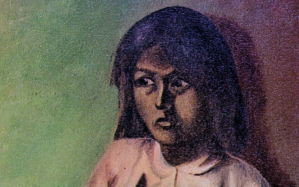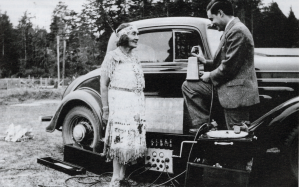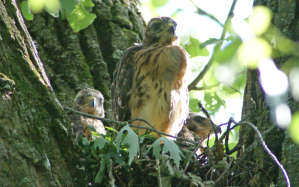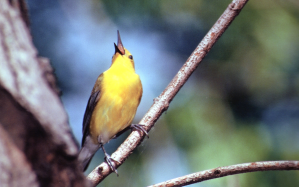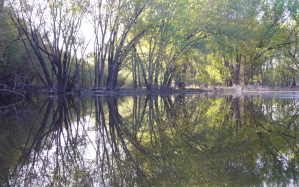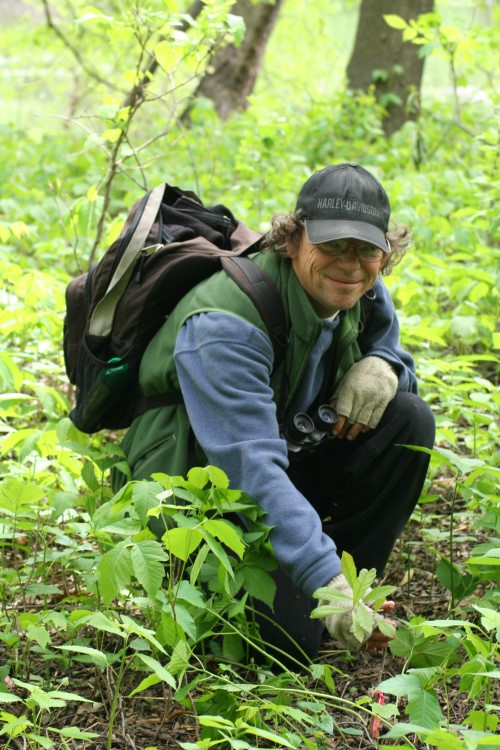(Copyright 2013 by Richie Swanson)
SNRreview Summer/Spring 2013
I knew my mom died having me, but Auntie never said anything about my dad, and I about hoped out my heart, hoofing it beside the surf, expecting a letter from him. Every day the mail was due, I climbed Náah Rock and looked up the beach, waiting for Johnny Pederson to come around Nesi’ka Head, and that’s why Otter Jack called me Puffin Ellie instead of Jean Ellie. Otter Jack said I would watch sweepers roll against Nesi’ka Head as long as a puffin would stand and guard her nest tunnel, and when I finally saw what I had to, I might fly off my rock like old-time Puffin Girl and dive down into an under-ocean cave and meet the wild-booming women beneath the waves.
I was going on nine, and I could whip any boy at school at memorizing, but I didn’t see what Otter Jack meant. He said Puffin Girl had breathed beneath water, singing with Surf Women, and they lit candlefish around their cave, and all the smoke came up through the beach, and first it made fog-Indians, and then it made fog-soldiers and fog-cannons, and so the old-time Indians had always known the whites would push them out of their Seal River homes someday.
I paid it no my mind.
I gave it none of what Auntie called credence.
Otter Jack might be the last Seal Indian ever, but I waited for Johnny and his wind-worn face, his eyes blue and watery and patient, his lashes soft and kindly, and then the tide got lower, and he rode around the point in his buckboard, whipping Nellie and Blackie, and I dashed down the rock and ran at him, and he turned his team, and a howler broke against a wheel. A big-banging crack! A leap of spray! The wagon smashed down, the horses broke free, and Johnny slid through surf-mud, holding reins, hollering and bouncing until the horses stopped high on the beach. He got up sandy and mucky, chin and nose bleeding, and he ran angry into the waves, his wagon knocking against a demon log, its front corner sinking, a wheel broken.
A howler leapt against the big canvas bag on the bed. The bag turned dark, swamped. It slid off and splashed under.
“Damn you, Ellie!” yelled Johnny. “I told you a-hundred times! Don’t run right at us!”
“That log hit the wagon, not me. I only wanted my letter.”
“Letter? You’re a bastard, Jean Ellie! Everyone knows but you! You got no dad! You’re illegitimate! You’ll never get no letter!”
I ran away barely breathing, his words pounding my ears, slamming after me. I cut across dunes, and finally I saw the bank of the Seal, and I ran down and threw myself flat in sand-grass, and Auntie heard me gasping, and she swung around in her beach chair just above the tide-mud, right where I had left her. “You all right, Jean Ellie?”
I ate a sniffle, I sat up. Antosia was looking at me too, lifting her rake, crabs falling down her apron, pinching her. But no one beat pain like Antosia. She stood right out in the goop and mud, tough-boned like Johnny, and she grabbed each crab slow, dropped them one-at-a-time into wood crates and then raked some more.
“Are you crying up there, love?” said Auntie.
“I got wind in my nose.”
Auntie climbed the bank in her wide-brimmed hat and leaned above me, eyelashes long and up-curled, her gulps moving tight against her white collar and black tucker. “Did you get in Johnny Pederson’s way?”
“No.”
Antosia came close too, and she looked down the river at the ferry–only Johnny and his mailbag were on the scow, not his horses or wagon, and Auntie wrung her hands, and I got up, watching them close.
“Johnny called me a–”
I couldn’t say it, and I hoofed off again, and Antosia spoke low in her man voice behind me. “Easy, Ettie, she has to bear it, or she’ll never mind anyone.”
“Will to!” I said.
“Hold your tongue and stay right here beside this bend, or you and I will row right over to Mister Pederson,” said Auntie.
“Easy, I told you, let her figure it,” said Antosia.
I hoofed it past the bend and climbed a half-dead spruce leaning over river-mud, and I watched them argue it. They had been best friends a long time before Auntie had come to get me at the church nursery in Washington D.C. They had left Philadelphia twenty years ago, and they got here before the cannery or log mill, and they put up cabins with boards from a schooner wreck. And by the time the wool mill and schoolhouse was built, their husbands went off, and now Antosia lived in the house behind ours, `tending the cow that gave us milk and the chickens that scratched up arrowheads and Indian skulls from the dirt.
Auntie and Antosia kept at it, poking faces at one another like bully roosters, making considerations about me, and I slipped down soft from my tree, a snake sneaking away. I slunk along the bank, a coon sniffing quiet after shrimp, and I looked through my coon-mak at an ocean steamer standing spiffy across the river, its steam stacks giant above Front Street Wharf. I waved at Mister Buckhorn and his boys, but they were busy chaining logs off rail cars, donkeying them onto the ship—our south-Oregon timber was bound to undo the California earthquake! Fires had burned up San Francisco, but our trees would remake their skyscrapers, trolley cars, theater palaces, movie houses, dancing halls, the whole city!
“Hey, Ellie!” A girl from school—Myrtle Keefer–hollered from the channel past the river-mud. She leaned against the rail of her papa’s launch, waving, and Mister Keefer turned his boat closer, a silk top hat high on his head, his red side-whiskers all barbered and tall.
“We heard you wrecked the mail wagon!” shouted Myrtle
“Yeah!” Her sister Millie jumped in a feather-spray pompadour and a fancy catalogue dress. “They say you begged yourself a letter, Ellie!”
Mister Keefer whispered to little Mae, and she yelled too, “They say you dug down in Johnny’s bag for it!”
I ducked behind huckleberry bushes, lay flat in my old gingham, and I felt hot and weak, cold and hollow, black and sucky inside. I closed my eyes in my coon-mask and listened until the laughing and engine passed, and then I decided I was a deer. I sprang from the riverbank. I leapt through ferns, and my tail flashed white. I jumped over deadfalls, and my feet flew high. I got to trees and turned and blew a snort, looking behind me, and I went into the woods, sniffing along trails, nosing salmonberries. I came into a stump field, and I heard a splash, and I froze, spreading my nose and ears, and I wanted to paw and stomp the ground.
Suddenly Otter Jack shouted to himself, sloshing in a creek. “Bitch of an un-bought daughter!” He turned from a bank, holding a lamprey against his overalls, and he put his mouth over its head. He bit down. The eel stopped squirming, and Otter Jack sucked a finger, looking up, and I waved, and his face sank into worry, his moustache curving bushy and white against his wrinkles.
I had run more than I thought. I knew I should go back. But I pushed down through bushes to him–because it was only me–Ellie who always helped him carry stove wood when he brought his cart to Auntie’s–who sat quiet to watch the exact ways he dipped his squaw net in the surf–who begged Auntie until she would sell his salmon with Antosia’s crabs to the cookhouses and ships and hotel.
“Where Auntie?” He knifed the eel open edgy.
“I’m lost, Otter Jack.”
“Auntie know you gone off?” He tossed away the gut-string mad. “Sheriff find you way back here, who you think he blame?”
He tossed the eel on top of others in his dugout and stared down ugly, and I got in his canoe and sat and looked up the creek at water flowing through a blaze of sun and then pouring green and smooth through a tunnel of granddaddy cedars lofty and dark. “You live up there?”
“You know I live in any one place, they run me out.” He got in with a thump, nearly tipping me. “I stay out a’ their way, they let me `lone. You be the same, Ellie. They just crows. They scream n’ hop at one `nother over nothing more’n a dead dog-shark. They steal their own eggs–anything.”
“Well, they’re building up San Francisco again, ain’t they?”
“Earth Thunder shook that city n’ make whites pay blood money because they steal land, kill Indians n’ make so many sky towers.”
“Skyscrapers,” I said.
He grunted and swung us into the current and quit paddling. He just steered, singing in his old Seal language. He stretched out words in his throat, groaning scratchy like seabirds, hooting gruff like owls, screaming harsh like hawks, and then he twittered bubbly and fast like the little wrens in the creek bushes. He sang like I wasn’t even there, like only the trees and birds listened, and I got swollen and slumpy inside, goose-bumpy like some girls get from preachers, and then I saw my boots on top of his eels–holey and muddy and patched with cowhide, not laced-up walking shoes like the Keefer girls wore.
“Sing another?” I said.
“Puffin song ‘nough.”
“Well, what about that eel? Did it bite you?”
He breathed no behind me, and then we drifted to the creek-mouth, and The T’Vault was steaming out past the river-mud, its red paddlewheel dripping blue-gold splashes down into the Seal–Johnny’s bag was on board and heading just fine to Philo’s Landing, I bet.
“Otter Jack?”
I thought he breathed yes.
“What’s an un-bought daughter?”
“Eel bit me, and I got mad.”
“But what was one?”
“Sometimes a husband got a wife without paying for her, and then they have to hide their daughter, so a rich man won’t take her for a slave. Sometimes the bitch of an un-bought daughter get traded all the way to the Columbia.”
“Always?”
“Sometimes she find luck. She dream it, but she can’t tell it. She hide it in a stump or a knothole.”
“How do you hide a dream in a tree?”
He smiled and quit talking. He slid us against alders, and I got out, and he dug beneath his eels and tossed a couple candlefish at my feet–the little oolichan so silvery and slippery-looking they seemed like they might still leap out alive. Their lips curled up snarly, and their fins were waxy, leaky like kerosene beneath my nails, and I stuffed them in a pocket, and then I flashed silver too, squirming away through bushes. I ran down the bank of the Seal, racing on sand, and Auntie came calling and hugging me. She glanced crying at Antosia and some man, and I wiggled from her arms and wiped her tears from my face, they stung so hot without stopping.
“Oh, Eugenie!” Auntie cried, meaning my mom. “Forgive me for taking my eyes off Ellie!”
“I got lost!” I said. “I didn’t mean to! I saw Otter Jack!”
“Just now?” The man leaned handsome above me, wearing driving gloves, a fedora, a snake-skinny tie, a tweed suit from the east.
“This gentleman came just in time, just as we missed you,” said Auntie.
“He came all the way from Washington D.C.,” said Antosia.
He took my hand dignified like he might kiss it, and his eyes searched me up and down, blue like Johnny Pederson’s, blue like mine, and he set his lips important, crinkling his chin-dot, and I decided he was my dad, standing tall and spare, finally finding me. “Yes sir, just now! I found Otter Jack’s cabin, I’d say!”
“Please to meet Doctor Brown, Ellie,” said Auntie.
“From the Bureau of American Ethnology,” said Antosia, “an anthropologist. He drove clear down from Kernville today, looking for where Otter Jack lives.”
“Not on any reservation!” I said, and then the man leaned above me like a beach crow, his eyes got sideways and sly, and I decided he was a fake, a cheat. “I won’t tell you!” I said. “Never!”
He strutted past me, flapping his suit-shoulders straight, and he followed my footsteps toward the creek.
* * *
Auntie’s and Antosia’s lots were the last two in town, tucked against the dunes, hidden behind shore pines and fenced with cedar slats and sprawly-crowned cypresses, so the sand wouldn’t blow in and bury both the houses and gardens and Old Miss Mare and everything else, especially Auntie’s water barrels. She kept them along the house, and the morning after we met Doctor Brown, the rain pounded our roof so hard she grabbed my ear, dragged me from the kitchen and stopped at the door, pointing at the water pouring off the eaves into her barrels. “After church, you are to clean every jug in the shed. You will carry every jug here and fill it. You will carry every jug back.” She pinched and twisted my ear. “Not a speck of sand will remain left in any barrel. Not a drop of water. The next time you run off, remember your mother’s watching from above, and the cougar wastes no time after he screams.”
“Otter Jack probably cleared out all the cougars.”
Auntie hissed in disgust, swatting my rear, and she marched off to put on her tailored dress. But Antosia gave me an umbrella. She took me out and walked me beside the mud road, holding my hand, sighing constrained until we got up into town, and then I decided I was a horse. I neighed and galloped up sidewalk-planks and trotted right up Seal Street and the steps of Gearhardt’s Store. The porch was empty, everything Sabbath-closed, and I tippy-toed along a bench, a high-wire girl from San Francisco, and Antosia came up under the roof too, and she gave me her cow-brown look, pleading, and I hopped down and balanced myself along a crack between floorboards.
“What about Johnny calling me that word?”
“It came out of his mouth, not yours, so you smile it away, or you ignore it.”
“Well, what about church? Did you and Auntie ever go to the same one? Sit in the same pew? Before I was here? Did you and your husbands ever take the wagon together to St. Mary’s? Or to Methodist Episcopal?”
Antosia roiled beneath her gray-flannel dress, pulled at her doily-laced ruche, swiped her hair thick-palmed. “Auntie will tell you when you get old enough.”
I climbed onto the porch’s rail and hung onto a post. “How old?”
Antosia scowled at me, “Ellie, get down from there!”
I twirled around one-footed, and a river-horn blasted: The T’Vault was pulling in from Philo’s Landing, knocking against the wharf down on Front Street, and the bumps bounced through the dock and up through the wooden sidewalks and clear up Seal Street into the rail and my legs. “I’ll see if Johnny’s bag really made it.” I said. “I’ll `tend church with Auntie.”
“No, I promised Auntie I would walk you all the way to St. Mary’s.”
But I was already off the porch, peeling off shoes and stockings, and I ran to the steepest part of Seal Street, and I slid down through mud as runny as corn-cake batter, deeper than my shins, and I cut into an alley, turned, yanked up my hem, and I slid down Orford Street and past the Keefer’s millinery and their house, and Myrtle laughed from inside their carriage in front of their new cement walk.
“Injun’ Ellie!” yelled little Mae.
“What did your father write you?” yelled Millie.
“Is he going to marry Aunt Ettie?” yelled Myrtle. “Or Antosia?”
They tittered, and I jumped onto the carriage’s foot board, and Myrtle stayed in back with her sisters, tipping down her rose-wreath hat, and I climbed in and stared across the front seat, and she got up, glaring back green-eyed, all aghast. She wrinkled her nose, and I screamed against it, “Un-bought soldier whore!” She shrank, getting white, and I turned to Mae. “Un-bought baby bitch!” Mae burst into tears, and I screamed against Millie. “Un-bought cur!” Millie flew back, hands on ears, eyes rolling up, pompadour falling, and I jumped into the mud again, and I high-tailed it, feeling the heat of their hate behind me.
I ran slipping across Front Street, and I looked back, and Mister and Missus Keefer came out of the house, and Missus stopped at the carriage, fussing over her angels. And Mister grabbed his horse-whip, looking stern in his topcoat, and then there was only mist, only soft-hitting drizzle and mud between us, and he watched me the way I had seen gulls watch crabs, their eyes sliding oily and sleepy-like, and I refused to run. I just stepped hasty, and Mister Keefer gulped, biding his time, because the folks from Philo’s Landing were coming off the wharf, and he didn’t want them to see.
I wiggled through the crowd and slipped beneath the wharf, a snake again, and I got beneath the cannery dock, and I lay flat on a log-boom, feeling my heart pound, biding my own time.
Finally church bells rang. They stopped. No one came after me.
I crept out, and the sky was high and warm and white, and I snuck home, and no one was waiting, and the howlers rumbled low and lonely out past the river, holding back their stampeding steps like they were barely breaking, just swelling and pulling their churn forever beneath themselves.
I put on overalls and left a note.
Sorry, I couldn’t decide which of you to go to church with. I tried and tried and couldn’t. Be back with the skiff after the tide, promise.
Love, Jean Ellie.
P.S. Sorry, the water jugs was were was too heavy to lift.
* * *
I went to the river, got in our skiff, pushed off, but the tide came in strong, and the boat shot sideways, and I paddled with an oar and landed backward on the other side. I pulled the skiff by a line back to the mouth, tied it, climbed the bank, and a Tin Lizzie was parked on the beach. Balloon tires! A rain roof! Headlights like crab-eyes! Travel trunks on running boards! No one around it anywhere!
I got in and stood behind the wheel, the first girl ever to drive up the coast to the top of the world–to a town where everyone had a dad, no one mocked anyone, and I never got mad, I never lied, because everyone treated everybody else nice, the way Otter Jack treated me.
I stepped on the clutch pedal, pulled out the throttle, and then a gull flew at me, wheeling from the surf. It landed right beside the car, peering at me, and then he looked crafty at the surf, making that biding gulp, and he raced down at foam, and then hundreds more flew up, diving into waves, floating, pecking swells. The candlefish were running, the gulls gorged, I should have known! But see? I wouldn’t need to pack much food, not any camp torches either.
Some bird bobbed clumsy on a breaker, twisting itself funny, and then it waddled crooked up onto the beach–a puffin gnawing its wing!
I had only seen puffins close-up in fishnets before, all dead, all with silly white eye-masks on black faces, their orange bills funny and fat, and now this puffin pecked oolichan from surf-mud, and she gulped and flapped, and only one wing worked, and she bit at the other, and her little blond hair-curls shook confused beside her head.
Wasn’t she a mama puffin, needing to feed babies?
I did some thinking and then walked deliberate from the car, and Puffie waddled toward the surf. I chased her slow. I dropped down, grabbing her, and my wrist hurt. Her bill had it, and I pushed it off, got a hand around it, and fish gruel squirted out, and I got up, her feet kicking me strong. But I had her good, she had to concede it. I kept her bill shut, holding her close, afraid I might crush her, and she growled and then blinked quiet, eyes yellow and gleaming, red-rimmed like some sad clown, black-dotted, expecting to die. But I soft-talked her, stepping steady, and she made a miserable burr-noise, and she shot whitewash on me all the way to the skiff. I put her down deep in a crab crate, and I saw some new kind of fish line tangled around her bad wing, cutting into a leg, and I closed the lid, wanting to go get Auntie’s sewing scissors before she and Antosia came home. But I took up the oars, and the tide bonked us right back against the bank, and I planned different.
I allowed the tide to hurry us up the river, and I turned the skiff into the mouth of Otter Jack’s creek, and I rowed to the cedar tunnel, and then the waves were rumbling far-off, and the surf-sounds swept chilly into the tree-shadows, and the harder I rowed, the more I hummed. I quit the oars and pushed hair tufts behind my ears and put up my hand like a puffin-mask, and I growled and burred, becoming an old-time puffin singer, and I smelled like a seabird too, like a whole sea rock of puffins and gulls stinking of bird dirt. The skiff drifted, and Puffie made no sound. I peeked in the crate, and a cannon ball hit the lid, and I sat on it, afraid I had made her jump, and she had broken her skull.
But then the creek got slack, and I saw a float house across a slough, and strings of oolichan hanging in front, and I floated close, and a face came to the door-window–white as a ghost, nothing but bone! I flew off the crate, it crashed. I ran through water chased by foot-splashes. I got on the bank and hid behind a woodpile, and then a voice moaned, and I got lifted, and the bone-face came at me, black-wet eyes!
But arms hugged me and made me still. Otter Jack stood holding me, white rings around his eyes, a white spot on his nose. “You all right, mask was stuck to my face is all,” he said.
Doctor Brown was kneeling, pressing Puffie against the bottom of the skiff. “It’s only a face casting,” he said, “plaster of Paris used to measure anatomical dimensions.”
“Leave my puffin alone!” I said.
He held a knife above her, worked it down, and whoomp-floomp-boom! Puffie flew above the creek as straight as a train on a track, gone in a half-second.
“You brung her from the beach?” said Otter Jack.
I nodded proud, and Doctor Brown smiled grand. “Half of mankind couldn’t have done it, not one person in one-hundred. You must be a pretty smart young lady.”
“Smart as a fox,” said Otter Jack. “Best in Seal City. Brave as a bear. Stubborn as that bird.”
I jumped against him. “I sang the puffin song! I did it! You wanna hear?”
* * *
I sang in front of the oolichan strings, dancing, swirling like fog, and I snapped my fingers and lit the candlefish in the Surf Women’s cave, and Otter Jack and Doctor Brown clapped their hands, their eyes getting merry.
“You go inside,” said Otter Jack. “Take off them clothes. Put on the shirt from the peg.”
I went in, and a giant-sized fur hung from the table to the floor. A grizzly robe! I put it on head and all, and I called them inside, and I looked through the eye-holes, shaking the mouth and fangs, and Doctor Brown hooked his fingers beside his chin, growling at me, and he then sat at the table and fiddled lonely with his notebook. “My little girl…my daughter…she’s so many miles away…I won’t see her until at least November.”
He picked up his pencil, but there was only room for two at the table, and so I sat on the floor in the corner, pretending to be dog-tired and sleeping, the fur smelling rooty, scraping leathery and warm against my skin.
Otter Jack hung my overalls outside by the oolichan and then leaned creaky in the doorway, looking back down the creek. “We row her home.”
“We don’t have time,” said Doctor Brown. “The ladies will look here. I’ll say words for you and Ellie.”
“Won’t matter.”
“Yes, I think it will. Please, I must go back to Siletz tomorrow and make words with Depoe Charlie on Tuesday. You and I barely got started, and then we had to stop.”
Silver tapped the table twice, two dollars! Auntie gave only four bits for two carts of Otter Jack’s wood!
Otter Jack sat down, and Doctor Brown recited names in English and trade language, and Otter Jack said them in Seal. He sang a bear song I had never heard, and then Doctor Brown rolled out a map, tugging his chin, a-puzzling something.
“Seal Island Rock ain’t out there anymore,” said Otter Jack. “It was the first rock, and Seal people n’ Puffin people came out of the cracks. Otter people n’ Bear people came out too. But white man blow it up n’ made it into the jetty.” Otter Jack mumbled low, but I seen him nod. “Why white man knock down so much? White women got teeth inside?”
Doctor Brown wrote feverish.
“Grizzly Girl get berries one side a’ this creek, Black Bear Girl on the other,” said Otter Jack. “They laugh mean at one another, and Grizzly Woman n’ Black Bear Woman go out n’ wrestle on the beach. They turn into surf rocks just other side a’ Nesi’ka Head, and they still growl, but you don’t hear ‘em `cause you inside that tin ‘traption a’ yours.
“See how I hang oolichan? The oolichan live way out past the rocks, and I point their heads this way, so they come back, don’t stay in ocean.”
Doctor Brown flipped pages backward, reciting again. “`Renewal.’”
“That word gone for Seal Indians.”
“How did the tribe say `again’ or `weght’?”
“`Tribe’ is just a white word. It don’t match any Seal word.”
“Once more, please, can you say the Seal words for ‘our’ and ` Nesi’ka’? `Father’ and `papa’? `Mother’ and `náah’?”
Otter Jack scowled ugly, saying the Seal, and I went out. Otter Jack had got hog stubborn–why?
I threw them their grizzly robe back inside. I put on my overalls again and went behind the float house and slipped down into Otter Jack’s dugout, and I snuck fingers inside me and explored extra-close.
Maybe only Keefer girls had teeth.
The water sighed secret through the slough, hissed beneath the float logs beneath the house, laughed across ripples–someone watched?
Plunks and splashes! Oars in the cedar tunnel!
“Ellie!” Auntie was coming.
“Oh, Ellie!” And Antosia.
“You here, Otter Jack?” And Mister Keefer!
I shoved off from the house, paddled behind a logjam, was already running across a deadfall when Doctor Brown hollered out the door at Mister Keefer. “I made Ellie my assistant!”
* * *
I ran through skunk cabbage and woods and across all the dunes and into broom brush, and I hoofed it slow along a game trail, saving my wind, looking for hiding places.
I found the creek-trickle, and I came out to the beach right before Nesi’ka Head, and seabirds were swarming on top, flying like bees at their hive, and I figured Puffie looked down and knew me.
But which puffin was she?
Dynamite blasted! Foam leapt! I leapt! It was only a slow-rumbling breaker, spraying the point.
“Ellie, stay!” Antosia shouted, coming along the creek-trickle with Otter Jack, and I gave them a big-beans glare and turned and started toward Náah Rock, but the Tin Lizzie swerved around it, and Otter Jack looked at my feet, stopping me, and the car kept coming.
It stopped in front of me, and Auntie got out, raising her vine-maple switch. “I told you `bout running off, Ellie.”
“No, please, don’t blame her.” Doctor Brown pulled off goggles and a scarf, looking like some famous aviator in the newspaper. “I delayed her. I insisted she wait at the float-house.”
“She ran before that.” Mister Keefer got out, glaring over his shoulder, and he hoofed it huffy to the surf, dipped in a bucket, stirred in some lye with a drift stick.
Antosia knelt down, squeezed my shoulders, stared at me deep. “And you said those things, Ellie.”
“Not before Myrtle and Millie made fun of me.”
“Forget Myrtle and Millie and Mae. It’s better Auntie teaches you now, so you won’t get beat all the time.”
“Let me get beat if I want!”
“No.” Antosia spun me, and Auntie grabbed me. Auntie sat me against Nesi’ka Head, slung me across her lap, and her switch sang down, and it lasted so long I became the silence of seals, not wanting to know her, to talk with anyone, and then she stopped, and I looked up, and Otter Jack and Doctor Brown were leaning against the car, not wanting to watch, looking at the sun falling instead.
Auntie stood me up, her jaw set stingy, her eyes dewy, and Mister Keefer came and dipped a rag in suds and bore down on me with his man-teeth, red side-whiskers, stone-brown eyes.
“Be decent to her,” said Antosia.
“Every time a rat gets out of her hole, she spreads her venom,” said Mister Keefer.
He pushed the rag against my lips, and I tore it away, and he pulled my hair and shoved the bucket against my mouth, and a gush rushed in, and I hacked, and more water came in and in and in, and I gagged and bucked, and Antosia screamed. Something banged, the bucket was off me. Antosia had it, flung it, and the ground shook, and then she was down, and Mister Keefer swung blows on top of her, his fists knocking bone, and he flew up sudden, he hit the rock, and I jumped, seeing his head snap.
Mister Keefer flopped in front of Auntie, and Antosia hunched above him, her hands ready like claws, but he just lay there, and his mouth and nose didn’t move, not his chest either.
Doctor Brown knelt to him and poked his head and neck and wrists, touching him the same spooky way Antosia had once touched a dead kitten in Kidder Kat’s litter. Doctor Brown just rubbed his thumb across his fingers, feeling something, thinking, and Otter Jack looked toward town. “Two burdash,” he said. “One hifalutin `fessor. One girl without no white father.”
“And an Indian without a pass from any agency,” said Doctor Brown.
Otter Jack and Doctor Brown dragged Mister Keefer by his arms, pulling him along a rim of mud around Nesi’ka Head, and Auntie and Antosia sat me in the Lizzie’s backseat, lifting me a canteen of drinking water, their fingers heavy on its mouth, feeling something too–but their eyes felt nothing–the same as mine.
Otter Jack and Doctor Brown came back, and then I was just cloudy, just taking in the whoosh and whine of the surf, the wail, and oh, I was bad, Mister Keefer was dead, I was awful. The Lizzie popped and kicked, knocking my whip-sores, and Doctor Brown nursed her along, hugging Nesi’ka Head, sputtering through foam, and then we were on the next beach, and everything was behind us, and dusk and fog-wisps and black-stacked rocks was ahead, Grizzly Girl and Black Bear Girl and other Indian spirits. The Lizzie got up her speed, and then there was just darkness, just Auntie and Antosia and blankets around me, wind forever banging doors and handles and seats. My sores bounced, my bones rattled, and my feet pounded in and out of glows and shadows, because little fires burned waxy on candlefish, and I swam below with Puffie, and she was as big as I, and we ate the oolichan flames and all. We shook white masks and shell-money necklaces. We flew through water, and waves rumbled from our wings, rising and sinking sudden. The beach rolled. Gearhardt’s Store swayed and tipped, and windows crashed across its porch. An earthquake! Earth Thunder! A steeple shot down the street like a log tree off a yard line, and house-walls and stair-steps came next, rolling and smashing, and the whole town rocked. The wharf jolted, and the cannery and mills splashed into the river, sinking to their roofs, and plaster and teeth floated down, and Puffie and I caught fangs and attached them to our shell-money, and suddenly Mae and Millie and Myrtle looked nice at me.
We lifted our dresses, kicked up our legs and showed them bare all the way! Oh, the blue-green ripples! The pa-lunking of water! Myrtle laughed friendly with me! Millie did too! Mae too! We caught hats sinking down–pompadours tipped with bluebird wings and tanager tails and parrot plumes and ostrich sprays and bunches of hummingbirds. We waved the hats and made more ripples. We sang howls, yowls, rumbles, sweeping grumbles, and there was a pounding, a chugging, a whistle, a blow, and flames leapt from the school, its bell tower, Mister Buckhorn’s barn. Flames licked our shed beautiful, climbing Antosia’s walls, Auntie’s room, mine, and I lay beneath a ledge, just looking up at the fire pulsing red above the water, and Mae slid close beside me, beaming, and the top of our cave broke apart, and a white head came down as big as a stagecoach–a gull! The gull had red whiskers, a snarly nose, rat’s teeth! His bill snapped, and he raised a bucket at me, and I woke and bounced up beside Otter Jack.
We were on a train, and he sat in the tweed jacket and snake-skinny tie, the fedora low on his eyes, his gaze looking blank at yellow pines winging fast past our window.
“Where’s Auntie and Antosia?”
“Three cars down. Anyone ask, we don’t know `em. Brown buy us tickets. He give me suit. He go the other way.”
“Which way?”
“Don’t know. Auntie give you pill from him, so you sleep n’ stay put.”
“We going home?”
“No, Ellie, our homes be burned by the Keefers and everyone else by now. We going to Canada.”

